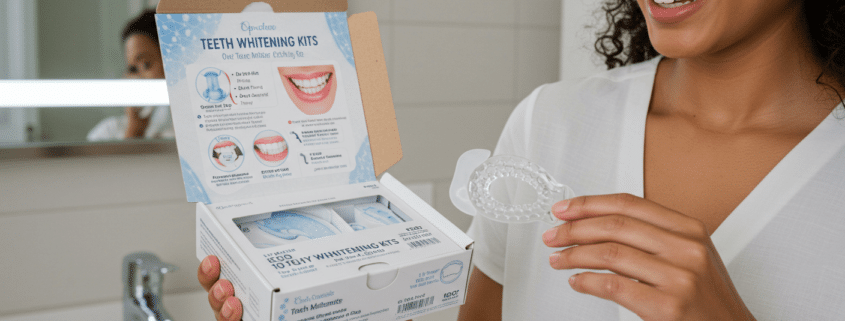The Hidden Dangers of Over-the-Counter Teeth Whitening Kits
Everyone wants a brighter, whiter smile, and over-the-counter (OTC) teeth whitening kits seem like a quick and affordable solution. Walk into any pharmacy, and you’ll find a variety of strips, gels, pens, and LED kits promising dramatic results in just days.
But here’s the problem—many of these products come with hidden dangers that can permanently damage your teeth and gums. From enamel erosion to chemical burns, using OTC whitening products without professional guidance can do more harm than good.
Before you reach for that whitening kit, let’s explore the hidden dangers of over-the-counter teeth whitening kits, why they can be risky, and what safer alternatives exist for achieving a radiant smile.
TL;DR – Quick Guide
- Main Risk: Overuse or misuse can lead to enamel erosion, gum irritation, and tooth sensitivity.
- Why It Happens: Many kits contain high levels of peroxide or acidic ingredients that damage teeth.
- Common Side Effects: Chemical burns, uneven whitening, and increased cavity risk.
- Are OTC Kits Safe? Some are, but improper use and poor-quality ingredients make them risky.
- Better Alternatives: Professional whitening treatments and dentist-approved at-home options are safer and more effective.
The Hidden Dangers of Over-the-Counter Teeth Whitening Kits
1. Enamel Erosion & Permanent Tooth Damage
Many OTC whitening kits contain high concentrations of hydrogen peroxide or carbamide peroxide. While these chemicals remove stains, they can also weaken your enamel, leading to:
- Permanent enamel loss
- Increased risk of cavities
- Weakened teeth that are more prone to cracks and chips
Unlike hair or skin, tooth enamel doesn’t regenerate, meaning damage is irreversible.
2. Extreme Tooth Sensitivity
If you’ve ever experienced a sharp pain when eating or drinking something cold, you know how frustrating tooth sensitivity can be. Overuse of whitening kits can:
- Expose dentin (the sensitive layer beneath enamel)
- Cause lingering pain, even when not eating or drinking
- Make teeth more vulnerable to temperature changes
Some people find their teeth permanently more sensitive after repeated whitening treatments.
3. Chemical Burns & Gum Irritation
Whitening gels can accidentally leak onto the gums, leading to:
🚨 Chemical burns (painful white patches on the gums)
🚨 Inflamed, bleeding gums
🚨 Long-term gum recession
Gum irritation can become permanent, exposing tooth roots and increasing sensitivity.
4. Uneven Whitening & “Chalky” Teeth
Many OTC whitening kits don’t distribute the whitening agent evenly, leading to:
❌ Blotchy or streaky results
❌ Teeth appearing “chalky” or dehydrated
❌ Inconsistent whitening due to deep stains that OTC products can’t remove
5. Increased Risk of Cavities & Decay
Enamel erosion from excessive whitening makes teeth more prone to cavities. The peroxide in whitening kits can also disrupt oral bacteria balance, leading to:
🦠 Higher plaque buildup
🦠 Increased risk of tooth decay
🦠 Weak spots on teeth that may require fillings
Are Over-the-Counter Whitening Kits Ever Safe?
✅ Yes, but with caution. Some OTC kits are dentist-approved and contain safe levels of whitening agents. However, misuse and poor product quality can still cause problems.
🔹 Safer OTC Whitening Options:
- Whitening toothpaste with fluoride (low risk of damage)
- Custom trays made by a dentist (ensures even application)
- Whitening strips with low peroxide levels (follow usage instructions carefully)
Safer Alternatives to OTC Whitening Kits
1. Professional In-Office Whitening
Done by a dentist, this method uses controlled peroxide levels and UV light to safely whiten teeth without damaging enamel.
🔹 Benefits:
- Immediate, long-lasting results
- Custom application to prevent gum irritation
- Monitored for safety and effectiveness
2. Dentist-Prescribed At-Home Whitening Trays
Dentists can provide custom whitening trays with safe peroxide concentrations, ensuring even application without damaging gums.
🔹 Why It’s Better:
✅ Safer for enamel and gums
✅ Lower risk of uneven whitening
✅ Longer-lasting, professional results
3. Natural Whitening Methods (With Caution)
Some natural remedies can help remove stains without harsh chemicals:
- Oil pulling with coconut oil (reduces plaque buildup)
- Baking soda toothpaste (mildly abrasive but should be used sparingly)
- Hydrogen peroxide mouth rinse (diluted) (use only occasionally)
🚨 Avoid DIY “whitening hacks” like lemon juice or activated charcoal—these can destroy enamel!
When to See a Dentist About Teeth Whitening
🔹 If your teeth feel sensitive, painful, or weak after using a whitening kit.
🔹 If you notice white spots, streaky whitening, or uneven results.
🔹 If your gums become inflamed, irritated, or develop sores.
🔹 If you want a safer, long-term whitening solution without risking enamel damage.
Key Takeaways
🚨 Over-the-counter teeth whitening kits can be dangerous if misused.
❌ Risks include enamel erosion, gum irritation, chemical burns, and sensitivity.
🦷 Safer alternatives include professional whitening, dentist-approved trays, and mild whitening toothpaste.
💡 If you experience pain, uneven whitening, or gum damage, see a dentist immediately.
A white smile is great—but not at the cost of damaging your teeth permanently. Choose safe, professional whitening options for long-lasting, healthy results!
FAQs
1. How often can I use OTC whitening kits safely?
Most kits recommend no more than once every 6 months. Using them too frequently weakens enamel and increases sensitivity.
2. Can teeth whitening kits remove deep stains?
OTC kits can only remove surface stains. Deep stains from smoking, coffee, or medications require professional treatments.
3. Do LED whitening kits work better than strips or gels?
Many OTC LED kits don’t actually speed up whitening. Professional LED treatments are more effective because they use higher-quality peroxide formulas.
4. Can teeth whitening cause permanent sensitivity?
Yes, if enamel is worn down too much, sensitivity can become permanent. This is why overusing OTC kits is dangerous.
5. What’s the safest way to whiten teeth?
A dentist-supervised whitening plan is the safest option. Professional treatments or custom trays offer the best results without damaging enamel.




Leave a Reply
Want to join the discussion?Feel free to contribute!